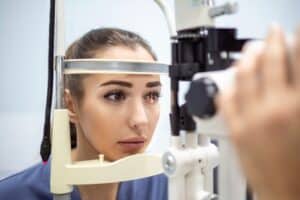Going to see your doctor regularly is an essential part of staying healthy. Yearly physicals are how your doctor ensures that nothing is going on with your body that could negatively affect your health.
Going to the eye doctor and having your eyes checked regularly is just as crucial for that exact reason. Regular eye exams ensure that your eye doctor can detect and diagnose any issues with your vision and eye health as early as possible.
Your eye health and vision are undoubtedly important, and maintaining both is reason alone to see your eye doctor for regular eye exams. But did you know your eye doctor can tell you about health issues that aren’t related to your eyes?
With a simple eye exam, they may notice early signs of health problems that other doctors may not see. Keep reading to learn about a few things your eye doctor can tell you about your health during a routine eye exam!
1. Eye Conditions

Of course, the number one thing your eye doctor is looking out for when they examine your eyes is any signs of eye disease and eye conditions. Eye disease is relatively common, especially in older patients.
Many eye conditions also cause permanent vision loss, so it’s vital to have them diagnosed as early as possible. Early diagnosis also means earlier treatment and the potential to slow down any damage to your eyes or vision.
The most common age-related eye conditions include cataracts, glaucoma, age-related macular degeneration (AMD), and diabetic retinopathy. These eye conditions can also tell your eye doctor a lot about your overall health.
Eye conditions are just one of the many things your ophthalmologist may pick up on during your eye exam.
2. Nutritional Deficiencies

Many eye conditions, even minor ones, can suggest nutritional deficiencies. If your eyes are dry, it could be because you aren’t getting enough omega-3 fatty acids.
Omega-3 fatty acids are vital for good tear production. If you have trouble seeing in low light, it could be due to a vitamin A deficiency.
And if you’re diagnosed with age-related macular degeneration, it may indicate you’re not getting enough necessary antioxidants. Your eye doctor can spot many of these deficiencies and help you correct them by recommending various nutritional supplements.
3. Intolerance to Certain Medications
Sometimes, patients may be prescribed a drug that doesn’t interact well with their body chemistry. The drug may be toxic to you, but it might not be apparent even when you’ve been on the medication for a while.
But your eye doctor may be able to see signs of drug toxicity if your eyes don’t seem healthy. Eye inflammation, especially of the conjunctiva, and scaly eyelids are common signs of drug toxicity.
If your eye doctor sees these symptoms and can’t find a direct cause, they may ask you if you’ve been taking any new medication and advise you to talk to the doctor who prescribed it.
4. Hypertension

Chronically high blood pressure can affect the blood vessels in your eye, specifically the retina. If your eye doctor sees odd bends or kinks in the blood vessels on the retina, they may recommend you have your blood pressure checked.
5. Diabetes
Irregularities in the blood vessels on your retina can also be a sign of diabetic retinopathy. High blood sugar levels cause the blood vessels to swell and leak.
If your eye doctor sees this and you haven’t been diagnosed with diabetes yet, they may recommend you see your physician as soon as possible.
6. Heart Disease
Eye doctors often use special imaging equipment to look for very early signs of common eye diseases. With this imaging technology, they can also spot the signs of an eye stroke, which can be caused by heart disease.
They can also tell if you may have high cholesterol if they see a yellow or blue ring around the cornea. They may recommend seeing a cardiologist if you show any of these signs of heart disease or potential heart disease.
7. Cancer
Your eye doctor can see early signs of cancer in your eyes and all over your body. Lumps on the eyelids may be a sign of skin cancer, but tumors all over the body can spread to the eye.
Brain tumors can even cause optic nerve damage, double vision, pupil size changes, and sudden loss of peripheral vision, which your eye doctor can see during an eye exam. If your eye doctor sees these signs, they can help you determine if you have cancer and receive a diagnosis to begin treatment.
8. Lupus
Lupus is another condition your eye doctor may be able to spot the signs of. Lupus can cause dry eye, swelling of the white part of your eye (the sclera), and swelling of the retina.
9. Rheumatoid Arthritis

Inflammation of the sclera can lead to swelling, a sign of lupus, but it can also be a sign of arthritis. If you have dry eyes and a swollen, inflamed sclera, your eye doctor will tell you to talk to your physician. Your physician can run the proper tests to figure out the underlying cause.
10. Many More Common and Rare Diseases

An eye exam can reveal the signs of more diseases and conditions, from STDs to multiple sclerosis to an aneurysm. But you should see your eye doctor regularly if only so they can detect and treat any eye conditions.
The fact they can also see the signs of so many other health issues shows how important your eye health is and how closely it’s tied to how well your whole body functions.
Take your health into your own hands and make your eyes a priority! Schedule an appointment at Traverse City Eye in Traverse City, MI, today!
